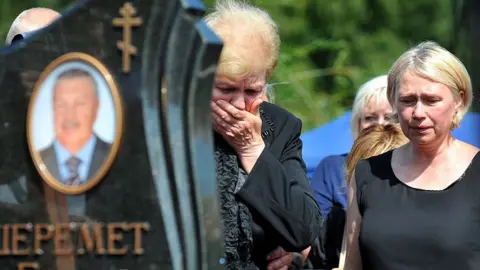Vitaly Shishov: Belarus dissidents who disappeared and died
 Getty Images
Getty ImagesThe suspicious death of a prominent Belarusian dissident - Vitaly Shishov - in Kyiv follows other unsolved cases involving Belarusian dissidents stretching back years.
Ukrainian police have opened a murder inquiry after finding Shishov hanged in a park, a day after he disappeared in the Ukrainian capital.
There are suspicions that agents loyal to authoritarian Belarus President Alexander Lukashenko were responsible. Shishov was running a group in Ukraine looking after Belarusians who had fled Mr Lukashenko's large-scale police crackdown, which began last August.
Another high-profile Belarusian dissident died in Kyiv in July 2016, blown up by a car bomb: journalist Pavel Sheremet. His hard-hitting coverage of political oppression in Belarus angered the authorities. Sheremet was jailed in 1997, beaten up in 2004 and then he emigrated to Russia, where he was a star TV reporter.
Sheremet also criticised both Russia's military intervention in Ukraine in 2014 and what he considered Ukraine's mistakes in relation to Russia.
In Kyiv he worked for Ukrayinska Pravda, an investigative news website founded by journalist Georgy Gongadze, who exposed official corruption. Gongadze was murdered in 2000, his headless body discovered in woods. Three policemen were later jailed in the case.
Amnesty International called the murder of Sheremet "a heinous crime" and "despicable attack on freedom of expression". It demanded a thorough, independent investigation.
In 2010 the founder of the Belarus dissident group Charter 97, Oleg Bebenin, was found hanged at his weekend home outside Minsk. Officials said he had committed suicide - a claim rejected by his colleagues, who said he had been committed to his work and had not hinted at any personal problems.
One of them, Dmitry Bondarenko, saw Bebenin's body and reported suspicious injuries: a broken ankle, cuts and scratches on his hands and chest, and bruises on his back.
Long-running mystery
The still unresolved disappearances of four high-profile Belarusian dissidents in 1999-2000 have been strongly condemned by Western politicians and human rights groups. They have urged Mr Lukashenko to investigate them properly.
However in 2011 a US State Department report on human rights abuses in Belarus noted: "there was evidence of government involvement in these cases, but authorities continued to deny any connection with the disappearances".
The four were:
- Yuri Zakharenko: ex-interior minister and opposition leader
- Viktor Gonchar: ex-deputy PM and Lukashenko critic
- Anatoly Krasovsky: businessman friend of Gonchar who funded the opposition
- Dmytro Zavadsky: cameraman who worked with Pavel Sheremet
The Council of Europe (CoE) - the top European human rights watchdog - said its own investigation pointed to "steps taken at the highest level of the state to actively cover up the true background of the disappearances".
The CoE report also named several top Belarusian officials suspected of involvement in the disappearances. It demanded a proper Belarusian investigation.
In 2001 two ex-staff from the Belarus prosecutor's office who had fled abroad, claimed that Zakharenko, Gonchar and Krasovsky had been killed by a special forces "death squad". Later an ex-special forces soldier made a similar claim. Mr Lukashenko denied ordering any such operation, Radio Free Europe reported.
WATCH: Belarus police crackdown in 2020